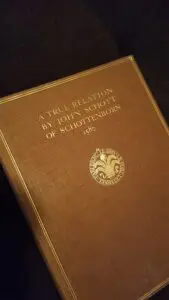The History of the Schott Name
There are several theories for the origin of the name Schott. The one described by Johann Schott von Schottenborn in 1587 is that Schott ancestors originated in the town of Schotten in Hessen, Germany. He describes how his branch of the family left Schotten and settled first near Eisemroth, Hessen. They were smelters and forgers of iron goods for many years until the late 1100s when the country and forests were destroyed due to the wars of Emperor Friedrich Barbarossa.
Without forests to provide the charcoal necessary for iron smelting, the family scattered throughout Hessen. Johann Schott von Schottenborn’s ancestors settled in Braunfels, Hessen. As these families scattered, they would likely have been known as being “zu Schotten” or “from Schotten,” which would have eventually been shortened to using Schott as a last name.
Later critics of the 1587 Schottenchronik are Von Hartmann Pieper and J. Reinhardt Schott, Jr., who published an update to this document sometime after 1960. They warn that Johann Schott von Schottenborn’s work is based on oral tradition, not documented fact or church records that can be objectively proven. They suggest several other possibilities for the origin of the Schott name. One possibility is that any foreigner that was from Scotia (Scotland or Ireland) might have been tagged with the name Schott or Schotten whether or not they originated from the town of Schotten. They believe that it would have been very common for a foreigner to have been singled out even before last names were commonly in use.
Pieper and Schott also suggest the possibility that Schott was a variation on a word for peddler or merchant. Another possibility is that it came from a medieval first name, Schotto.
While it’s true that there are many possibilities for the origin of the name and that the genealogical facts in Johann Schott von Schottenborn’s 1587 document are based primarily on oral tradition rather than documentation, there are a number of pieces of evidence that would seem to (at least partially) support his opinion.
A number of Schott family branches in various locations had coats of arms. While none of these are the same, many of them have similar objects on them—most commonly showing a pod or bundle of pods. (In German, a pod is a Schote—possibly a play on the name Schott.) This could indicate a connection among Schott families in many locations.
Johann Schott von Schottenborn mentions three Schott brothers who scattered from Eisemroth first to Worms, then to the Strasbourg area in the early 1200s. Other documents from the 1500s corroborate that there were indeed three brothers named Schott during this time in Strasbourg who had come from Worms. One document would have been in an archive that it is unlikely Johann Schott von Schottenborn would ever have seen; another was published after his death. So although his information may not have been 100 percent accurate, there is evidence that supports at least some of it.
Literacy and written documentation were rare in those days compared to today’s society. Much information was passed on through oral tradition, so it doesn’t seem unreasonable to believe that Johann Schott von Schottenborn’s information has at least some truth to it. As Sir Samuel Haslam Scott says “The account of the successive generations … and of the derivation of the surname … depends on oral tradition. But the tradition is at any rate venerable, and in the opinion of such an authority as Mr. Oswald Barron it presents an example of the genuine family tradition with no inherent improbability, in contrast to the ordinary family myth so distrusted by the genealogist.” [Note: Oswald Barron was a noted British authority on heraldry and genealogy.]
Therefore, it seems plausible to believe that a great deal of the 1587 document could be accurate, including its speculations on the origin of the Schott name, although it can’t be proven with complete assurance.
As Sir Samuel Scott concludes: “The name [Schott] is an old one, but it is not a distinguished lineage, nor is it an eventful record. The lives of the estimable make a less exciting story than the dramatic villainies of the unscrupulous.”
Sources:
Arnold, Friedrich E.G. Stammreihen der nassauisch-hessischen Familie Schott aus Eisemroth bei Dillenburg. Self-published, Hamburg-Blankensee, 1957. Available on microfilm 1181524, item 3, from the Family History Library in Salt Lake City. [This is one of the updates to Johann Schott von Schottenborn’s Die Schottenchronik. An incredible source of information on the village of Schotten and Schott family history from the year 1015 through the 1900s for many branches. This is primarily genealogical data with some written history, but shows all the Schott families that occupied Hessen through this time period. As you might guess from the title, it’s all in German.]
Pieper, Von Hartmann and J. Reinhardt Schott, Jr. Die Schottenchronik. Published sometime after 1960. [This is another version of Johann Schott von Schottenborn’s family history. This one is based on the original manuscript, rather than the F.E.G. Arnold version, which was based on a copy. These authors make a lot of the fact that the early Schott family history is based on oral tradition, and can’t be verified in any way and therefore, should not be relied on. They also claim that their version is much more accurate than the F.E.G. Arnold version because it’s based on the original, not a copy. While I certainly found some discrepancies, I would say these are minor. These authors, however, have added to the original with information from other sources, which makes this version more complete overall.]
Scott, Sir Samuel Haslam of Yews. “An Old German Family History.” The Ancestor (London, April 1903).
Scott, Sir Samuel Haslam of Yews. A True Relation by Johann Schott von Schottenborn 1587. Translation by Sir Samuel Haslam Scott of Yews. Oxford University Press, 1929. [An incredible find—I had seen references to this English translation of the Johann Schott von Schottenborn document by an English branch of the family, but had no idea how to get my hands on a copy. I finally found it in an Irish bookstore through a rare book site on the Internet—and they were more than happy to sell this to me. This book/manuscript is the basis for all of the really early Schott family history and the theories about how the Schott name came into existence.]


And that is why history is so fascinating … beyond or below or above the &#t6;21fac8s’ …thinking of real people … as flawed as any we know … but especially those who created wonderful things out of being flawed … with genius mixed in … Love what you created here out of your experience … connecting the present to the past, as it always is connected. Especially in its mysteries.
Dear Cathey
Do you know, if the mentioned book from Johann schot von schottenborn would BE somewhere available
I got earlier on the name as Schott von Schottenburg , But i assume now that it has to be von Schottenborn
Hi Leo,
I found a copy of the book online at a bookstore in Ireland, and was able to purchase it from them. But that might have been a fluke.
However, the English version published in The Ancestor (which I’ve referenced above) is available online here: https://dcms.lds.org/delivery/DeliveryManagerServlet?dps_pid=IE108845 (See page 199)
The German version is available here, but apparently you have to be at the Family History Center to view it: https://www.familysearch.org/search/catalog/87973?availability=Family%20History%20Library
The book that I show a photo of in my blog is also available at the Family History Library, but again, you have to be in the library to view it online: https://www.familysearch.org/search/catalog/751890?availability=Family%20History%20Library
Also here: https://books.google.com/books?id=1SMWAAAAYAAJ&pg=PA171&lpg=PA171&dq=johann+schott+von+schottenborn&source=bl&ots=UKUWtN4ddj&sig=6ya27M8IksjrUTcOx6Cpy4DDWqk&hl=en&sa=X&ved=0ahUKEwi9truZiKLZAhVBEmMKHRmICe0Q6AEINDAC#v=onepage&q=johann%20schott%20von%20schottenborn&f=false
Also: https://books.google.com/books/about/A_True_Relation_Written_Anno_1587_by_the.html?id=aeb2MgEACAAJ
Hope this helps.
Hi Carolyn,
My mother-in-law was a Schot [In Holland the double t became single], so I am interested in all about Schott. I will have a look in more detail another time, but I want to make you a compliment now.
Your site is a pleasure to visit.
I like to send you the line of Schott’s I have gathered over time back to Emmerich Schott born Braunfels (Germany) r1430.
Kind regards,
Otto van Driel, Holland
Hi Otto! I would LOVE to see what you have about the Schot family in Holland. I don’t know if they connect to my line, but I would love to try to fit more of the pieces together!
Hi I have a great-great-grandmother who was born Clara Schott in Swanage Dorset UK in 1817 and I can trace her ancestors living in Swanage back as far 1611